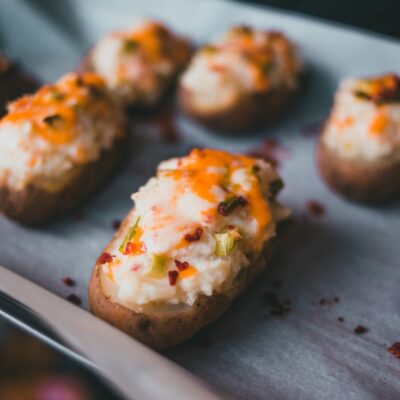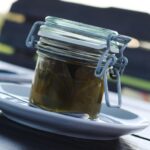No, potato skins are not safe for your pet dog. Potato skins contain ingredients and seasonings that are likely unsafe. If your sneaky dog has mischievously gobbled up some potato skins, keep an eye on them to ensure they are safe. It is especially important to ensure that they are cooked because raw potatoes can harm your canine.

Caution: This food is generally considered risky by the veterinary community. Dogs should not eat this food and should be monitored for adverse effects.
| Food Safety | Best to be cautious |
|---|---|
| Nutritional Issues | High in fat, Rich in carbs |
| Potential Risks | Digestive issues, Kidney problems |
| Symptoms | Loose stools, vomiting, discomfort |
How Many Potato Skins Are Bad for Dogs?
If you love this delicious potato snack, your dog is likely to end up eating some potato skins you just took out of the oven. So, the question is, can dogs eat potato skins without you having to worry about it?
Well, if it is just one or two potato skins that aren’t too big, they should be fine. However, you must keep an eye on them to ensure the food doesn’t cause them any distress. Additionally, if your little furry friend has ended up munching on a lot of potato skins, you must look out for signs of an upset stomach.
What Makes Potato Skin Unsafe?
Depending on how you cook potato skins, it typically has butter, cheese, salt, and pepper. Some people also like adding bacon bits. Regularly feeding your dog potato skins, even in small amounts, can be a bad idea since it may cause them to gain weight.
Ingredients used in making potato skins might not be toxic for your dog. However, long term, they can cause your pet tummy issues and even kidney problems. Butter and cheese are high in fat and are bad for your doggy because they have no nutritional value and can harm your pet if they are lactose intolerant (which they might be).
Signs Your Dog Ate Too Much Potato Skin
A potato skin or two might not harm your dog, or it may cause them to have a very upset stomach. Hence, it is best to be cautious and monitor your dog to ensure they are fit and fine.
In case your silly pet has somehow eaten too many potato skins, it is best to look out for the following signs:
- Vomiting
- Reduced appetite
- Lethargy
- Diarrhea
- Constipation
- Dehydration
It is important to monitor your dog’s behavior because it helps you analyze how well they are doing. Remember, whenever your dog eats a big amount of food they shouldn’t have, stand by and look out for signs of tummy troubles.
Frequently Asked Questions
-
Baked potato skin is unlikely to harm your pet. However, its ingredients, like butter and cheese, can cause them distress. Hence, it is better to give your dog a snack that’s beneficial for them.
-
No, dogs cannot eat raw potato peels or skins. Raw potatoes can cause poisoning because of the toxic elements present in them. It is best only to offer a small amount of cooked potato flesh occasionally.
-
Dogs can eat some types of cheese but especially not blue cheese. Since dogs can be lactose intolerant, it is best to ensure the dairy product will not harm your dog before you offer it to them.




